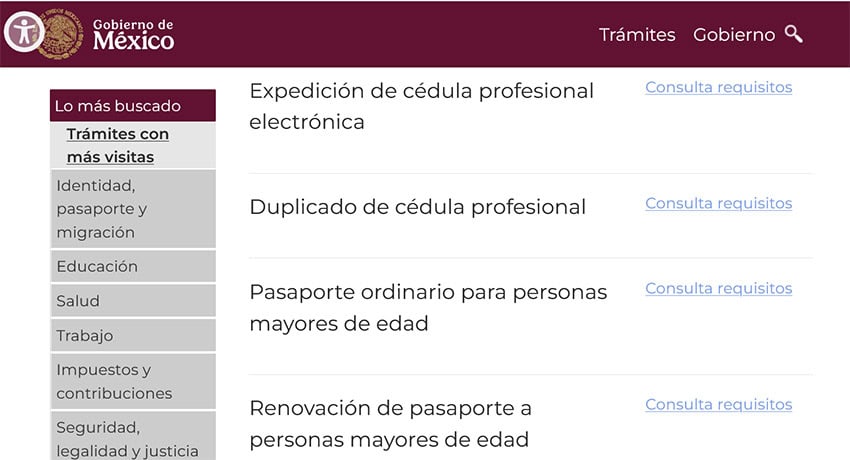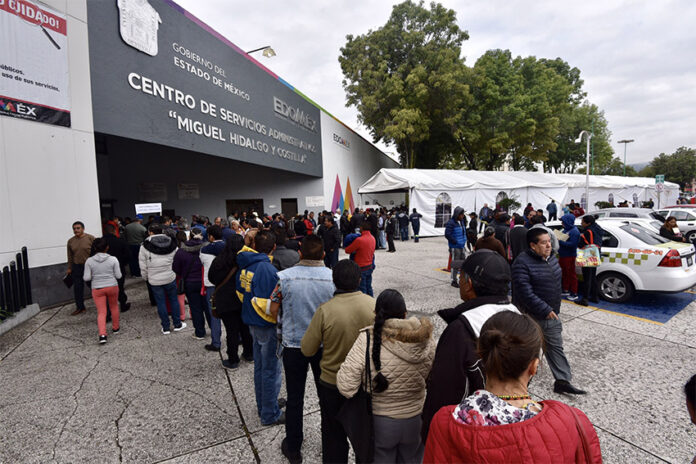The federal government on Thursday presented a draft law whose central aims include simplifying and digitalizing bureaucratic paperwork and eliminating corruption in Mexico’s public service.
President Claudia Sheinbaum initially said that the proposed legislation would be called the National Law for Simplification and Digitalization, but she subsequently declared that it would be called the National Law for the Elimination of Bureaucratic Procedures and Corruption.

“That’s what it will be called, that is its objective,” she told her Thursday morning press conference.
“The objective is to reduce the number of [government] procedures and by reducing the number, the possibility of corruption is eliminated,” Sheinbaum said.
José Merino, head of the government’s Agency for Digital Transformation and Telecommunications, said there are currently more than 7,000 different federal government procedures as well as hundreds of state and municipal ones in each of Mexico’s 32 federal entities.
On average, he said, a person in Mexico carries out 486 bureaucratic procedures over the course of their life, 85% of which are state and municipal procedures. They include applying for or renewing a driver’s license and paying property taxes.

“When there is an excessive number of procedures what we’re doing as authorities is hindering a lot of other things that people want to do in their lives,” Merino said.
The proposed law — part of the government’s Plan México economic initiative — should benefit companies, both Mexican and foreign, as it intends to simplify and expedite the bureaucratic processes they have to undertake when investing in the country.
One of the goals of Plan México is to reduce the average time between an investment announcement and the execution of a project from 2.6 years to 1 year.
The 4 ‘central objectives’ of the law
Merino said that the proposed law — which will likely be approved by the ruling Morena party-dominated Congress sometime later this year — has four main objectives:
- To make government procedures, the requirements for carrying out those procedures and their period for resolution uniform across the country.
- To “eliminate obstacles” for individuals and companies when carrying out bureaucratic procedures.
- To maintain “a good regulatory practice” in Mexico, as required by the USMCA free trade pact and the Mexican Constitution.
- To make it easier for people to “access what they have a right to.”
Merino also said that the law will provide a range of “concrete benefits,” including the reduction of “spaces for corruption” and the acceleration of “economic activity to generate shared prosperity.”
He said that the government wants to cut the total number of bureaucratic procedures, and their requirements and resolution periods, in half.

Merino also said that the government is aiming to digitalize at least 80% of procedures, allowing citizens and companies to carry them out online without the need to go into a government office.
How will the government achieve its goals?
Merino said that the government will implement a “national model of simplification and digitalization” to achieve the goals of the proposed law.
He outlined “nine components” of the model, including the creation of a “sole citizens’ portal,” or website, where “people can quickly see the catalogue [of procedures] and requirements.”
Merino also outlined 10 “simplification principles.”
He said that authorities would:
- Reduce the number of documents citizens and companies require when carrying our bureaucratic procedures.
- Not request documents that they can generate themselves.
- Eliminate “non-essential requirements” for the completion of bureaucratic procedures.
- Grant “the same validity” to digital documents as is given to physical documents.
- Prioritize attention to “procedures of greatest volume,” i.e. those that are most commonly carried out.

Merino said that the government’s plan to simplify and expedite the carrying out of bureaucratic procedures is “an ambitious project,” but one that is “very necessary.”
It will make life “much easier” for people and companies, he said.
Sheinbaum said that the proposed legislation is a “national law” because it is aimed at simplifying and expediting federal, state and municipal procedures.
“If a person is going to apply for their birth certificate, everything is simplified so that they can have their birth certificate very quickly,” she said.
“… If a small business wants to register itself, it won’t have to carry out 10,000 bureaucratic procedures to be able to register,” Sheinbaum said.
Mexico News Daily
